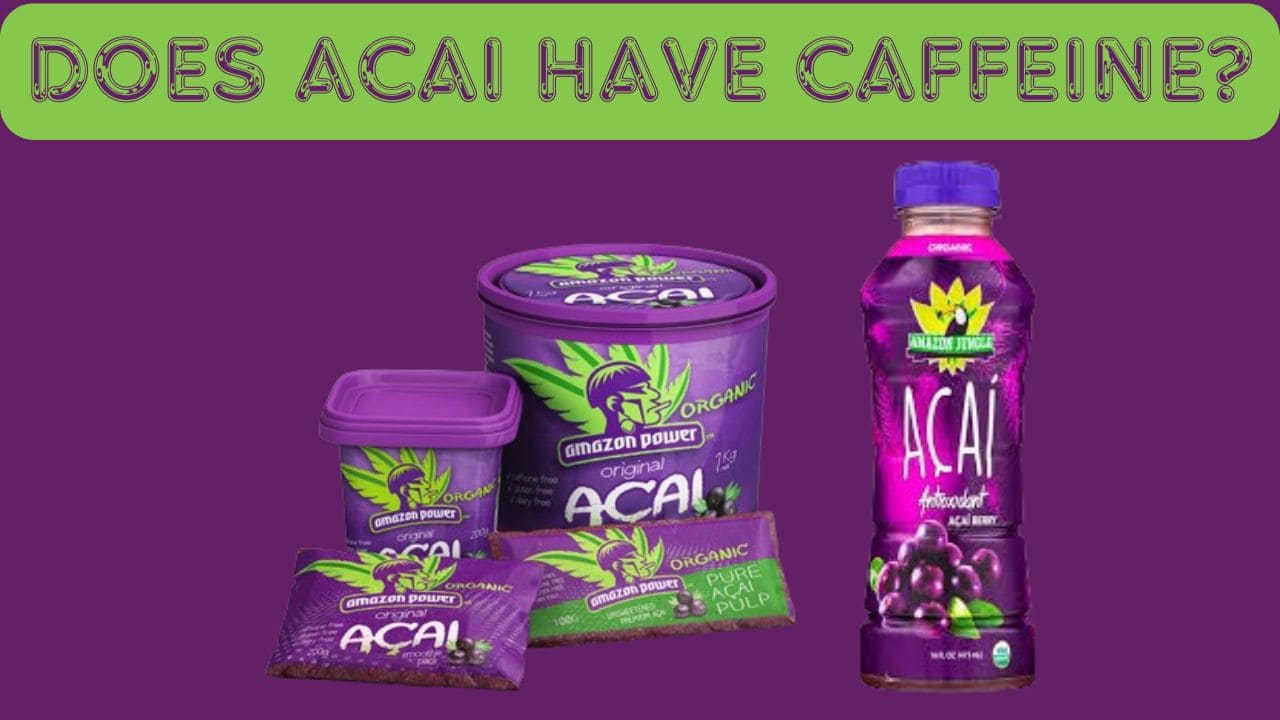Written By: Sherry Harris
Acai berries, the small purple fruits native to the Amazon rainforest, have gained immense popularity, particularly in the health and wellness community. Often hailed as a superfood, acai is touted for its numerous health benefits, from antioxidant properties to promoting heart health.
But as with any trendy food, people often have questions, and one common query is: Does acai have caffeine? This article dives deep into the composition of acai, examining whether it contains caffeine and how it affects your body.
Table of Contents
What is Acai?
Acai berries are not just another fruit; they are packed with nutrients that make them stand out. These berries are rich in antioxidants, especially anthocyanins, which are responsible for their deep purple color.
Additionally, acai contains a healthy mix of essential fatty acids, dietary fiber, and vitamins such as A, C, and E. But despite its impressive nutritional profile, acai is often misunderstood when it comes to its caffeine content.
Does Acai Have Caffeine?
Does acai have caffeine? NO, acai berries themselves do not contain caffeine. This myth likely stems from the fact that acai is often found in energy drinks, smoothies, and supplements, many of which do contain caffeine from other sources.
However, the acai berry on its own is caffeine-free. This makes it an excellent option for those looking to avoid caffeine while still enjoying a boost in energy and nutrients.
Acai in Popular Products
Acai is a versatile ingredient found in various forms, from powders and juices to smoothie bowls and supplements. However, many products that feature acai are often mixed with other ingredients that do contain caffeine.
For example, energy drinks or supplements that claim to have acai often include caffeine from sources like guarana or green tea extract. This can create confusion, leading some to mistakenly believe that the acai itself is the source of caffeine.
Acai Nutritional Information
Acai berries are nutrient-dense, offering a variety of essential vitamins, minerals, and other beneficial compounds. They are particularly rich in antioxidants, fiber, and healthy fats. Below is a table summarizing the key nutritional facts for acai per a typical serving size (100 grams of acai puree).
| Nutrient | Amount per Serving (100g) |
|---|---|
| Calories | 70-80 kcal |
| Total Fat | 5-6 g |
| Saturated Fat | 1.5 g |
| Total Carbohydrates | 4-6 g |
| Dietary Fiber | 3-4 g |
| Sugars | 0-1 g |
| Protein | 1-2 g |
| Vitamin A | 15% of Daily Value (DV) |
| Calcium | 2% of DV |
| Iron | 4% of DV |
Acai is low in sugar and provides healthy fats, including omega-3, -6, and -9 fatty acids, contributing to its many health benefits.
You Know!
Acai-Based Energy Drinks
To understand the association between acai and caffeine, let’s look at a specific example. A well-known energy drink brand markets a product that highlights acai as a key ingredient.
However, a closer look at the ingredients list reveals that the caffeine content comes from added guarana and not the acai. This highlights the importance of reading labels and understanding the sources of ingredients in the products you consume.
The Health Benefits of Acai
One of the key advantages of acai is that it offers a range of health benefits without the need for caffeine. This makes it an ideal choice for those sensitive to caffeine or for those who prefer to avoid stimulants altogether.
Antioxidant Powerhouse:
Acai berries are loaded with antioxidants, which help neutralize free radicals in the body. This can reduce oxidative stress and inflammation, which are linked to a variety of chronic diseases.
Heart Health:
Acai’s combination of fiber, healthy fats, and antioxidants supports cardiovascular health. Some studies suggest that acai can help lower cholesterol levels, reduce arterial plaque, and improve blood circulation.
Skin Health:
The antioxidants in acai, particularly the anthocyanins, are known to improve skin health. They help fight signs of aging and protect the skin from environmental damage.
Immune Support:
Acai is rich in vitamin C and other antioxidants that can bolster the immune system. Regular consumption may help your body fend off infections more effectively.
Digestive Health:
With a good amount of dietary fiber, acai supports digestive health by promoting regular bowel movements and a healthy gut microbiome.
Potential Side Effects
While acai is generally safe for most people, there are some considerations to keep in mind. Because acai is often consumed in processed forms such as powders, juices, or supplements, it’s important to be aware of added ingredients that might not be as healthy.
1. Sugar Content: Many acai products, particularly juices and smoothie bowls, can be high in added sugars. This can negate some of the health benefits and contribute to weight gain or blood sugar spikes.
2. Allergies: Though rare, some people may be allergic to acai berries. Symptoms can include itching, swelling, and digestive discomfort.
4. Nutrient Absorption: Acai’s high antioxidant content is generally beneficial, but in excessive amounts, it might interfere with the absorption of certain nutrients. Balance is key when incorporating acai into your diet.
Alternatives to Acai and Their Caffeine Content
While acai is known for its rich antioxidant content and nutrient density, there are several other superfoods that offer similar health benefits. Who are wondering: Does acai have caffeine? Here some of these alternatives to Acai contain caffeine, while others are naturally caffeine-free:
Matcha Green Tea:
Matcha is a finely ground powder made from specially grown green tea leaves. It’s celebrated for its high antioxidant content, particularly catechins, which promote heart health and aid in weight management. Matcha contains about 30-35 mg of caffeine per serving, providing a calm, sustained energy boost without the jitters often associated with coffee. It’s a popular choice for those seeking mental clarity and focus.
Guarana:
Guarana is a climbing plant native to the Amazon, known for its seeds that contain high levels of caffeine—about 40-80 mg per serving. Often found in energy drinks and supplements, guarana is used to enhance alertness and physical performance. Its stimulant effects are more potent than those of coffee, making it suitable for those who need a strong energy boost.
Chia Seeds:
Chia seeds are tiny, nutrient-rich seeds packed with omega-3 fatty acids, fiber, and protein. They are caffeine-free, making them a great alternative for those avoiding stimulants. Chia seeds are known for their ability to absorb water and form a gel-like substance, which can help with hydration and digestion. They’re often added to smoothies, puddings, and salads for an extra nutritional punch.
Goji Berries:
Goji berries, also known as wolfberries, are small red fruits rich in antioxidants, vitamins, and minerals. These berries are caffeine-free and are praised for their immune-boosting properties, supporting eye health, and promoting skin vitality. Goji berries are often consumed dried, in teas, or as an ingredient in health bars and snacks.
Camu Camu:
Camu Camu is a superfood native to the Amazon rainforest, known for its exceptionally high vitamin C content—one of the highest of any food. It is caffeine-free and offers immune support, making it a powerful alternative to acai. Camu Camu is often available in powder form and can be added to smoothies or juices for a nutritional boost.
Maca Root:
Maca root is an adaptogenic herb that grows in the Andes mountains of Peru. It is caffeine-free and is renowned for its ability to balance hormones, increase energy, and improve mood. Maca is available in powder, capsule, or liquid extract form and is often added to smoothies, oatmeal, or baked goods.
Green Tea:
Green tea is a popular beverage worldwide, known for its antioxidants and health benefits. It contains 12-30 mg of caffeine per serving, providing a gentle energy boost. Green tea is also linked to weight loss, improved brain function, and a lower risk of several diseases. It’s a great alternative for those who want a mild caffeine intake with numerous health benefits.
Cacao Nibs:
Cacao nibs are small pieces of crushed cacao beans, offering a rich chocolate flavor with natural antioxidants and fiber. They contain 20-50 mg of caffeine per serving, making them a natural source of energy. Cacao nibs are often used as a healthier alternative to chocolate in baking, smoothies, or as a topping for yogurt and cereals, providing a subtle energy lift along with theobromine, a compound that promotes a feeling of well-being.
| Alternatives to Acai | Caffeine Content (per 100g or typical serving) |
|---|---|
| Matcha Green Tea | 30-35 mg |
| Guarana | 40-80 mg |
| Chia Seeds | 0 mg |
| Goji Berries | 0 mg |
| Camu Camu | 0 mg |
| Maca Root | 0 mg |
| Green Tea | 12-30 mg |
| Cacao Nibs | 20-50 mg |
You Know!
👉 Does Strawberry Fanta Have Caffeine?
How to Incorporate Acai into Your Diet
If you’re looking to add acai to your diet, there are several ways to do so:
Smoothie Bowls: One of the most popular ways to consume acai is in smoothie bowls. Combine acai puree or powder with frozen fruits, yogurt, and a sprinkle of granola for a delicious and nutritious breakfast.
Juices and Smoothies: Acai juice or acai powder can be blended into smoothies for a nutrient boost. Just be sure to check the label for added sugars or other unwanted ingredients.
Supplements: Acai supplements are available in capsule or powder form. These can be a convenient way to get the benefits of acai without the hassle of preparing it.
Final Thoughts
Does acai have caffeine? In conclusion, acai berries are a nutritious and versatile superfood that offers numerous health benefits without the need for caffeine. While some acai products may contain added caffeine from other sources, the berry itself is naturally caffeine-free. This makes acai an excellent choice for those who want to boost their energy and health without relying on stimulants.
Whether you’re adding acai to your morning smoothie, enjoying an acai bowl for breakfast, or taking acai supplements, you can feel good about incorporating this superfood into your diet. Just be sure to choose products that are low in added sugars and sustainably sourced, so you can enjoy the full benefits of acai without any unwanted side effects.
FAQS
Q: Can acai give you an energy boost without caffeine?
A: Yes, acai can provide a natural energy boost due to its high carbohydrate and healthy fat content. It sustains energy levels over time without the jitters or crashes associated with caffeine.
Q: Is acai safe for children and pregnant women?
Yes, acai is generally safe for children and pregnant women when consumed in moderation as part of a balanced diet. However, it’s essential to choose acai products that are free from added sugars and artificial ingredients.
Q: Can acai help with digestion?
Yes, acai is high in dietary fiber, which supports healthy digestion. Fiber helps regulate bowel movements, prevents constipation, and promotes a healthy gut microbiome. Regular consumption of acai can contribute to overall digestive health.
Q: What is the best way to store acai products?
Acai products, such as frozen puree or acai powder, should be stored according to the manufacturer’s instructions. Generally, frozen acai should be kept in the freezer until ready to use, while acai powder should be stored in a cool, dry place away from direct sunlight.

